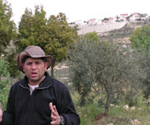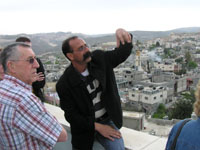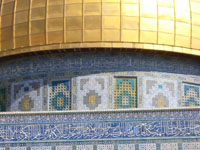< Report Six: “Such Big Meaning to Us”
Today's Realities and Tomorrow's Leaders
Delegation to Palestine/Israel
August 25, 2013
Reports and Photos from IFPB's 47th Delegation (August 2013):
Delegation 47 Announcement
Report 1: Our Long Arrival
Report 2: Multiple Faces of Jerusalem
Report 3: Against These Odds
Report 4: "Out Of The Same Place"
Report 5: “Isn’t That Enough?”
Report 6: “Such Big Meaning to Us”
Editor's Overview: The delegation has come to a close; as of this posting most have already returned home. This report ties together varied experiences and reflections from the last several days of the delegation. The pieces include glimpses of how much delegations — and follow-up solidarity advocacy and activism they inspire — can have meaning for local activists struggling for justice.
The reports below share stories of connection with, and welcome from, local Palestinians. Stories and poems feature reflections on identity and belonging; a visit to the destroyed Palestinian village of Lifta; the Jewish Holocaust, history and justice; the use of US tax dollars; and visits to Nablus, Bethlehem, Bil’in, Hebron and more.
Heart Cooks Brain (or some other angsty Modest Mouse song title)
By Amanda J.
Two men with assault rifles just boarded our bus.
On August 10th, I shut myself off emotionally in preparation for this delegation. I knew I needed to harden my heart in order to stay sane despite all I knew we might see. About an hour ago I had just started to let myself feel again as I wrote:
After teasing me all day for not knowing how to speak Arabic, my Palestinian/Jordanian/Palestinian friend Ihsan suddenly got serious. “You ARE Palestinian. You have every right to be here. You know that, right?”
I quietly giggled “I know, I know,” and distracted myself with something else. I do know. I know my family history and I cognitively know I deserve to be here. But it’s sometimes hard to feel after years of immersion in a predominantly Zionist New Jersey community–a community where the maps on the walls of synagogues I played cello in for bar mitzvahs had no demarcations of the West Bank or Gaza Strip, where my Jewish friends of European ancestry were raised to feel entitled to visit and even move to Israel, and where one friend confronted me at an awkward middle school party to say “What do you mean your dad is from Palestine? Palestine doesn’t exist!”
Later that day we arrived at the New Askar Refugee Camp in Nablus. We were heartily welcomed at a community center and were then led to a children’s performance of the traditional Palestinian folk dance, dabkeh, with a crazy break dance interlude.
Afterward, the delegation took a nighttime walk around the camp and one member began to speak formal Arabic to our hosts. I watched the faces of some of the guys–such surprise at this young woman being Asian, from America, and also able to speak Arabic quite well.
Unlike her, I don’t speak much Arabic. I hesitated to tell anyone–in English or in Arabic–that I’m Palestinian. I expected to be resented for all of the privileges I have as a white American citizen. I expected to feel ashamed for being so disconnected and especially for not speaking the language.
But on the way back to the community center, I asked (in Arabic) one of the louder guys his name.
“Do you speak Arabic?”
“Not much.”
“What, how do you speak Arabic?”
“My father is from Palestine, but I’m from the US and I don’t really speak.”
His blue eyes exploded with light.
“You’re from Palestine? How–why–how did I not know! Welcome, welcome! Wow! This has such big meaning to us. You should tell people! SEE what they do! This has such big meaning. We should throw you a big party!”
Even in a good state I’m no writer, so I don’t want to spend this late hour trying to describe how it felt to be so genuinely and wholly welcomed by this man who was born and raised in a Palestinian refugee camp.
I do, however, want to attempt to describe how a semiautomatic rifle quickly destroyed my first attempt at processing this loving connection. I decided to sit alone on a bus ride to give myself space to release for a minute. To reflect on what we had seen in the camp, who we had met in the camp, and how it made me feel (the latter, a question I refused to ask myself for most of this trip). I think I was finally feeling a fraction of the entitlement to be here that my Jewish friends were taught to feel about themselves growing up. As I was scribbling about the blue-eyed man’s expression when he spoke with me, I saw movement out of my peripheral view and looked up: a very young man in Israeli military gear holding an X95 with both of his hands.
He and another man had boarded our bus because, unbeknownst to our sleepy selves, we had arrived at a checkpoint. So the armed men entered and walked silently down the aisle, looking at each of us and our belongings. It was (thankfully) uneventful, and absolutely nothing compared to what Palestinian residents here have to deal with. Just a stark reminder of where we are–in occupied Palestinian land–and the psychological impacts the militarized power of the occupying state.
This report is excerpted from the original post on Amanda’s blog
VIDEO: New Askar Refugee Camp Dance
By Micah Danney
Palestinian kids broke it down for us in New Askar Refugee Camp. Afterwards a guy from the camp said a kid had found a wad of money and asked us if anyone had lost it. . . in an impoverished refugee camp. . .
A tortilla in a refugee camp
By Sydney Levy
Before going to bed in the house of my host family at the New Askar refugee camp, I had the opportunity to through another community center in the camp. This one focused on children. It was late at night, close to midnight, and there were no children in the center at that hour. To my surprise, I found there a group of volunteers from Spain - about half a dozen, each one from a different city - and we engaged in a spirited conversation in Spanish. They were preparing dinner for themselves, and they offered me and my friends some.
"Bienvenidos a Palestina" (welcome to Palestine), they said, as they offered us a slice of tortilla. No, not a Mexican tortilla, but a Spanish tortilla. A delicious mixture of eggs and potatoes fried to perfection. I gladly joined in.
The conversation was interesting. At the beginning, we were talking past each other. The Spaniards were in the camp fort three weeks preparing and implementing activities for the children in the camp. They could not understand that our group had arrived that very night to the camp and was departing the next morning to another destination in the West Bank. "So what are you doing here in such short amount of time?" "What can you hope to see in just a few hours?" "How can you expect to understand the realities of the camp?" "How will your short visit be helpful?"
They were not critical, just curious. As curious as they were to have met, probably for the first time, a Jewish person (me). We had a lot to talk about.
I had my questions too. "Are you connected to any group in Spain"? "Do you know about BDS?" In both cases, the answers were no and no.
We were really talking past each other.
It took me some time to understand what was going on and to put the pieces of the puzzle together.
As Americans, we are in the center of Empire, and the best way we can be useful is to listen, learn, and come back to our communities in the US and effect change in this country.
As Spanish citizens, they probably had less need to change the foreign policy of their own country. Their activism was Palestine for three weeks. Our activism was in the US, really, and god knows for how long.
Each one contributes their piece.
ACT FAST! ONLY A FEW SPOTS STILL OPEN! This delegation provides an opportunity to participate in the Palestinian olive harvest season — generally a time of great community activism, where people of all ages from Palestine, Israeli peace and justice groups, and international groups join farmers in their harvest. You will hear from Palestinian farmers and learn of the importance of agriculture to the Palestinian economy and culture. As with other delegations, you will also meet additional Israelis and Palestinians working for peace and justice. |
Lifta
By Bob Osborne
LIFTA
Shadows dance in empty rooms
Ghosts are everywhere - living and dead
No doors separate. No windows shut.
Memory is lost. The stones tell the story.
A "ruin" in the mist of modernity
No one comes. No one goes.
Imagination is the only way in
If you want to visit what it used to be.
How do you contemplate a collective death?
Nothing left - not just you
Where does a place go to die?
Lifta doesn't live, its stones hold the story.
Editor's Note: For photos of Lifta, browse to the end of the delegation photo slide show
We’ve Seen This Happen Before: Further Thoughts on the Holocaust, History and Justice
By Kristian Davis Bailey
This is my third piece about how the narrative that the Jewish Holocaust was an exceptional event in history prevents us from achieving a just peace for everybody - from Palestinians, to African Americans, and more. You can read the first two pieces here and here.
This thought has been lingering with me for much of this delegation, but I think a lot of the suffering that has happened in the past (like The holocaust) and a lot of the suffering that is happening today (like the occupation of Palestine) could be avoided if the Western world learned how to incorporate the narratives and suffering of colonized/brown people into our collective consciousness.
While The holocaust is presented as this ahistorical, unique, horrendous-without-comparison event, the truth is that millions of people experienced parts of the Nazi regime’s holocaust in the century before Hitler came to power.
King Leopold of Belgium killed ten million people in the Congo during his quest for rubber and colonial prestige in the 1880s.
The Germans, thirty years before attempting to exterminate Jewish people, committed genocide against the Herero of modern-day Namibia, making its first use of concentration camps, forced labor pools, medical experiments, and working people to their death.
Even though Germany and the rest of the West was aware of this genocidal atrocity, Germany received no punishment, the genocide was swept under the rug, and the West continued its colonial violence across Africa and the rest of the global south.
To have punished Germany for its genocide would have been to open up a whole can of worms for every Western state with colonial projects—for the United States and its genocide against indigenous Americans, for Britain and the Netherlands and their genocides against the Cape San in South Africa and the Aborigines in Australia, the list goes on.
So instead of valuing the lives of these millions of people and learning from our past, letting Germany off allowed it to reproduce this methodical genocide in even greater proportions against the 12 million people who perished during The holocaust.
It is not hard for me to understand why anyone would feel guilty for the mass murders of Jews, during The holocaust. It is hard for me to understand how and why the Western world feels so guilty about what it did to Jewish people, exclusive of the additional six million non-Jews killed during the Nazi’s holocaust, including Poles, Soviets, Roma, LGBT, mentally or physically disabled, socialists and religious dissidents.
Why didn’t African slaves get their own state? Why didn’t Native Americans get their own country? Why didn’t the Roma get their own state? Why isn’t there an LGBT state? Why don’t former colonies across the world get reparations?
It is also hard for me to understand why the West felt guilty enough to give European Jews their own state and to keep quiet when the state of Israel performs similar violations of humanity against other peoples.
And why do Zionists drum up so much fear about the “hostile Arab nations” around it? I would be absolutely terrified of Europe and the United States if I were trying to avoid another genocide of my cultural group. It was the entirety of Europe and the United States that betrayed the Jewish people and contributed to the only real attempt to systematically wipe them off the face of the earth that we have witnessed! 32 nations refused to change their immigration policies during World War II to allow Jewish refugees in. Many nations, including the United States, turned away boats of refugees at the shore - to send many back to their deaths. Governments across Europe acquiesced to Nazi control and isolated Jews from their civilian populations.
This all makes it incredibly frustrating to hear so much rhetoric about the victim state Israel sitting in the middle of all these hostile Arab countries that want to wipe it off the face of the earth.
Yet it is this rhetoric of genocidal Arabs and an all-knowing the United States that keeps the occupation of Palestinians (who had absolutely nothing to do with the plans or horrors of The holocaust) in place and perpetuates the cycles of conformism, apathy, fear, and racism (with Islamophobia replacing antisemitism) that allowed The holocaust to occur!
All of this happened because The holocaust evoked a guilt that cannot be felt for brown people, for non-English speaking people, for the Roma of Eastern Europe, for the LGBT people.
The West has not felt guilty or shameful enough about its past actions to stop doing them today or in the future.
This is the main reason why the West won’t give reparations to the formerly enslaved or colonized—if one state admits that it was wrong, the entire system becomes morally inconsistent. As things stand, it can retain the material wealth of its exploitative systems without doing any of the work to repair the damage its created. The irony of flying to Israel through Frankfurt on Lufthansa was not lost on me at all. Germany is not the most prosperous nation in Europe because of its culture or technology; it’s the most prosperous nation in Europe because of its colonial past—which influences its culture and technology. There are similarities to Israel and its relative affluence here.
But, as Zoughbi Zoughbi founder of the Palestinian Conflict Resolution Center told us the other day, “We want Palestine to be created out of a sense of collective responsibility” and a sense of guilt, shame or victimization.
I agree that collective responsibility—more than shame and guilt—is what will mobilize the people of the Western world in support for justice at home and abroad, but in order to get to that sense of collective responsibility, we also must make our historical and cultural narratives accountable to everyone who has suffered throughout history and recognize that we cannot privilege the security of one group over the security of others.
To reuse a quote from my second post on this topic: I believe it is fine to study situations of injustice and to talk about them as much as we can. There is nothing wrong with memorializing the horrors of the past, but the impulse for empathy that naturally arises from such memorials must be used to care for and prevent the suffering of all people—not to protect one’s own at all other costs to everyone else. I encourage everyone to think about how similar ignoring the pleas of Palestinians in the United States was to ignoring the pleas of Jews and others during The holocaust. We must learn to stop making the same mistakes.
It really boggles my mind what people are willing to pay attention to and how far they have gone to ignore the reality of what’s going on. I pray that we keep working to achieve justice. And I pray that we are successful.
Inshallah!
Freedom Street in Bil'in
By Sydney Levy
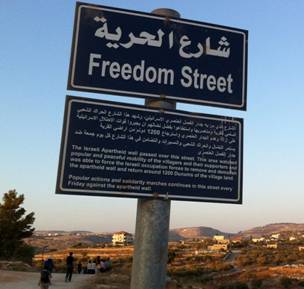
The determination, sacrifice, and steadfastness of the people in Bil'in managed to move the Apartheid Wall further to the West, returning to the villagers 1,200 Dunams of their village land. That's a small piece of the land stolen from them to build illegal Israeli settlements, but it is a start. Standing by this sign a number of years ago would have been unimaginable. This is where the fence used to be the last time I was in Bil'in. From this very spot, Israeli soldiers would throw skunk water, tear gas canisters, and rubber bullets at non-violent protestors, Palestinians, Israelis, and international alike. How many people had to die needlessly to get these Dunams back to their rightful owners?
The people of Bil'in are undeterred. They are cleaning the terrain, planting trees where Israeli soldiers uprooted or burned them, and even built a children's playground--not surprisingly under threat of demolition by Israeli authorities.
The struggle continues.
Your Tax Dollars
By Kristian Davis Bailey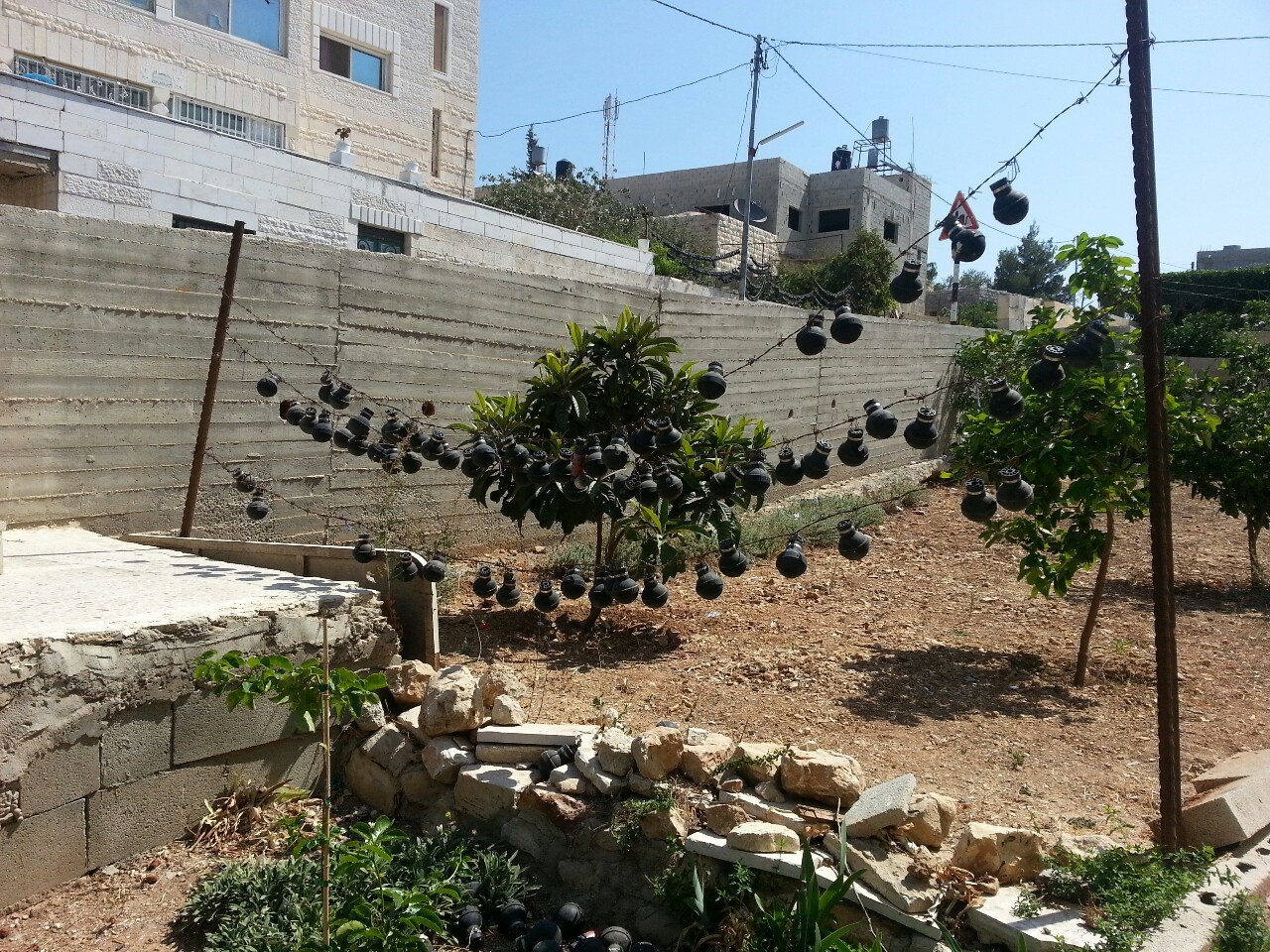
Was trembling with tears, grief and rage in Nabi Saleh. I lost track of how many children, people Bassam and Manal told us were injured, killed, psychologically traumatized. One child (a, two year old), would not let her mother feed her or change her for a year after one attack. Israeli soldiers knowingly shot tear gas into a home full of the village’s children and women. With no exit, the women handed their children out of the second story window to people below. The children thought their mothers were trying to kill them. The tear gas canisters are made in Pennsylvania.
"I have to be honest," Manal told us. "Your tax dollars are killing us."
This report is excerpted from the original post on Kristian’s blog. For the full post, see: http://postcardsfrompalestine.com/post/58773872253/was-trembling-with-tears-grief-and-rage-in-nabi
Father Abraham Had Many Sons
By Alice Su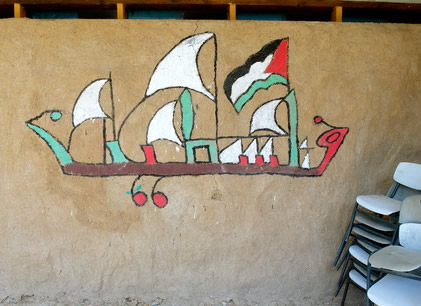
In Nablus, the site of ancient Samaria where Jesus spoke to the woman at the well, we ask Saif (name changed) if the Good Samaritan comes from here too. Saif laughs. “This is a parable. It is not really happened. It’s a story from Jesus, y3ni, to say the rabbis cared so much about all their rules they did not help the dying man. So they were religious, but not good.”
Saif jokes about the last tour he led here, an Indian group of Christian pilgrims. “This group [ours] is better,” he says. “You know why? That group comes for their own salvation. They was just going to churches, churches, churches, mass, mass, holy site, holy site. They want to go to paradise that way. Maybe you are the good Samaritans, because you come for awareness of the suffering. You are aware of the living stones, not only the stones they were seeking.”
Mash’allah.
We left Jerusalem to spend four days in the West Bank, staying with Palestinian hosts in small villages and, on the first night, in a refugee camp. Amjad tells us how New Askar’s residents built its own community center. UNRWA doesn’t recognize them because there are other camps nearby, but 6,000 people live here within 1 square km. They have kids with cerebral palsy, only a few hours of running water each week, and a graveyard beside the kindergarten where seven martyrs from the Second Intifada are buried. Shahada, “martyrs,” Palestinians call them, because they are civilians who were killed unarmed in the streets, sometimes in their own houses, two of them while collecting medicine for the injured.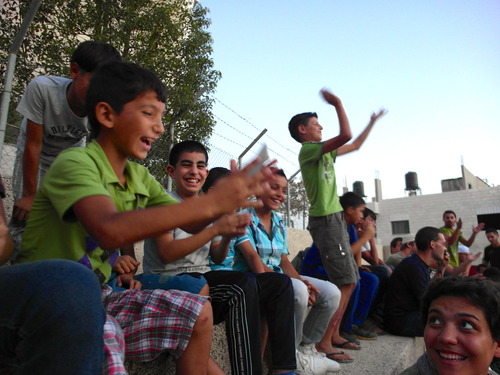
The New Askar kids perform dabka for us, a Palestinian traditional dance that looks like awesome cardio. Mohammad Assaf, the guy from Gaza who just won Arab Idol, blasts from their speakers and the refugee kids go wild with whistles and whoops.
The older shabab [young men] fuse dabka with hip hop and b-boying, and at one point everyone is doing aerials and backflips. I am thinking, They should go on America’s Best Dance Crew! And then, It’s so dark I can’t see, why don’t they turn on the lights? And then, There are no lights – oh yeah, I’m in a refugee camp. For a second I’d forgotten that the stage was in a cage.
At night, I stand at the edge of the camp with several shbab [young men]. There are piles of garbage, scrap metal and glass around us. Darkness blankets the gravel-and-sand trail down to the road and across a few hills, halting only at the top where a cluster of Israeli settlements is bathed in blaring light.
“Do you remember the Intifada?” I ask the guys around me. Most of them were 12 or 13 when it happened, so they didn’t understand everything, but yes. One of them went to jail for 4 months because he threw a rock. “I thought Amjad said you were all against violence.” They laugh, “Yes! Of course we are all against violence! But when the soldiers are coming to your streets and house and shooting gas at your mother and sisters, what you do?”
Mohamed, who’s 32 and paints houses in Ramallah for a living, hosts three of us in a room with glow-in-the-dark stars on the ceiling. His dad goes through checkpoints and walls to paint cars in Tel Aviv, as he has every day since age 11. Mohamed’s brother used to be a chef in Tel Aviv (What’s your best dish? I ask. They tell me he’s great at Middle Eastern salads, and get a kick out of my knowing what tabbouleh is), but can’t go to Israel anymore because of his identification card. Their dad can because he’s older, but needs three different documents that must be renewed every 6 months. In any case, now Mohamed’s brother paints walls.
Mohamed’s sister-in-law is shy at first. It takes an hour of sit-and-chat, drinking tea with Fayruz in the background, before she asks, Can I ask the Arabic-speaking girl a question? “!تفضلي ” I say. “Go ahead.”
“Y3ni… when we see the Chinese people you all have like the same face, so I want to know, when you see us Palestinians, do we all look same to you too?”
I choke on my tea, laughing. “Wa lahh, la!! No, you look so different! Your faces are totally not the same. And I’m sure if you came to China, you would also see many different Asian people’s faces.”
“But we see on television! They are all same.”
“Ah, it would just take some time, don’t worry. You would see.”
My fellow delegate Miriam is Jewish. Mohamed doesn’t pause for a second when we reveal this. “We like Jews. We have many Jewish Israeli friends. And before when we worked in Israel, kana hayya heloo, it was a sweet life and better, y3ni?”
The problem is not religion, Mohamed says. The problem is that all the new checkpoints and walls make the trip to Ramallah hours longer than in the past. Things are expensive, jobs are scarce, their electricity and water are controlled and it costs more and more to reach the houses he’s got to paint. “The problem is the occupation,” Mohamed says. “And the settlers.”
There’s a sign on the door of Bethlehem’s Church of the Nativity, where thousands gather for Christmas Mass each year:
“We are hoping that: If you enter here as a tourist, you would exit as a pilgrim. If you enter here as a pilgrim, you would exit as a holier one.”
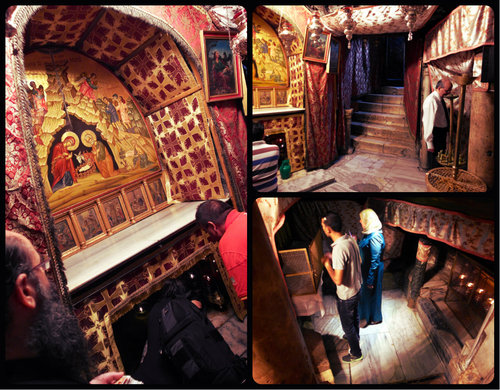
Inside, stairs lead down to a musty enclave, overwrought with curtains, paintings, chandeliers and candle smoke. A silver star lies on the ground beneath one Gothic altar, bedecked with the elongated faces and gold ornaments of Orthodox tradition. Two feet away, Roman Catholicism has laid claim to its own JC cradle spot, guarded by painted Baroque figures, all voluptuous and billowy.
Two tour groups crowd into the holy site at once. Their respective guides make cold eye contact, then start waving their flags and guiding each group into lines so they can file under the altars, clamor to touch the silver star, and take photos of and with the religious art. Catholic tourists crash into the Orthodox ones. Elbows knock against knees. Clicks and flashes abound. A girl from the Greek group leans against the wall, chewing gum and using her camera phone as a mirror to adjust her eyeliner.
Jesus, I think, Is this what you were born for?
In my memory, the little town of Bethlehem is not still or calm or sweet. It is sandwiched in a blur of villages and camps and the Wall, always the Wall, standing cold and indifferent in a warped reality where international laws mean nothing, settlers burn mosques, soldiers spray skunk water into mothers’ eyes, police arrest children in the middle of the night, peaceful protestors die and the world makes up excuses not to care.
In Nabi Saleh, villagers hid their children in a safe house. The Israeli soldiers found and filled it with tear gas. Palestinian villagers passed their kids out a window to escape. A two-year-old couldn’t understand, thought her mother was throwing her away, then wouldn’t talk to her for a year. “You don’t love me so I don’t love you,” she cried.
In Jenin, an Israeli actor, Juliano, started a children’s theater to help refugee kids cope with their trauma. Acting helps with PTSD, the staff explain, except it’s not post-traumatic per se because the trauma is ongoing. Two years ago, Juliano was murdered in front of the theatre. Terrified parents pulled their kids out of the program. The theater struggles on.
There are moments between these stories when I feel real. Sousou is the two-year-old daughter of Souad, our homestay mother in Bil’in. After a maqlouba dinner we gather on plastic chairs in a terrace above the goats and chickens. We drink tea, joke with Souad’s five younger kids, and chat about the occupation. Souad’s husband works at a gas station. He used to farm, but settlers have taken all their land. The kids love football, but on Fridays everyone stays inside and Souad locks the door because soldiers patrol everywhere. Ahmed has asthma because he breathed tear gas at two months old. Amira wants to be a lawyer but she wonders, what’s the use if international laws don’t apply to Israel anyway?
Sousou bounds onto the terrace and starts announcing something in happy Arabic toddler-speak. Souad gasps, claps her hands over Sousou’s mouth, starts laughing so hard she can’t speak. The boys are doubled over in mirth too, rolling on the ground until they catch their breath. Finally they explain that Sousou was yelling about her experience just now in the bathroom. She’s recently conquered potty training and wanted to let everyone know how much she pooped and how well she did it. Souad shakes her head, the rest of us crack up, and Sousou beams, satisfied that we all got the message. . .
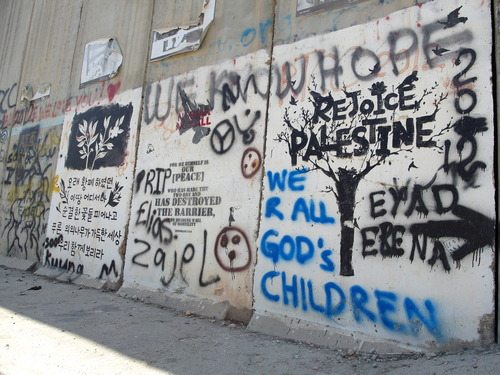 . . . The people I love in Palestine are the peacemakers. Christian Peacemakers Team and Operation Dove, who walk to school with Palestinian children and stand guard with shepherds so they won’t be attacked by settlers. Kairos Palestine, the group of Palestinian Christians who’ve issued a statement calling on the world to stand with them against injustice. Wi’am, the conflict resolution center three minutes’ walk from the Wall in Bethlehem. A quote from our meeting with its director, Zoughbi Zoughbi:
. . . The people I love in Palestine are the peacemakers. Christian Peacemakers Team and Operation Dove, who walk to school with Palestinian children and stand guard with shepherds so they won’t be attacked by settlers. Kairos Palestine, the group of Palestinian Christians who’ve issued a statement calling on the world to stand with them against injustice. Wi’am, the conflict resolution center three minutes’ walk from the Wall in Bethlehem. A quote from our meeting with its director, Zoughbi Zoughbi:
"Some of us have recreated God in our image, and He becomes a tribal god, a real estate agent god, a cheerleader-for-hate god. This is not the God I worship."
We’ve got to hear all sides of a problem, Zoughbi said, but objectivity is not the same as neutrality. “Call a spade a spade. You need to know the truth and it will liberate you,” Zoughbi says. “Don’t be pro-Palestinian. Just be pro-justice.”
This report is excerpted from the original post on Alice’s blog. For the full post, see: http://aliceysu.tumblr.com/post/59064262807/father-abraham-had-many-sons
Hebron
By Vic and Barby Ulmer
One of the largest Palestinian cities, Hebron has a strident Israeli settler community in the heart of the city. Our Palestinian guide, Issa, an active member of Youth Against Settlements, is denied access to some streets of his city (including the street his grandmother and entire family lived on), although he has a guide's license and permit from the Israeli Military (IDF) to go into the old city When we were with him two Israeli soldiers denied him access. Reason? No reason. They seemed to delight in their power given by their commander.
Issa has been denied several time and allowed several times… it is arbitrary, capricious. He's also been arrested and beaten so he has a slight limp, but he doesn't resist because he's dedicated to non-violence and is an active recruiter for that method. The organization has summer camps and many activities for youth to educate them in non-violence. . .
. . . Al Tuwani, a very rural Palestinian agricultural village south of Hebron, is without electricity. The ideological Israeli settlers nearby are living in trailers that are place holders waiting for permission to expand the settlement. Settlers erected electrical fences, they say, to “protect” their animals and people from the villagers. But the settlers have burned village crops, poisoned their water and helped instigate the IDF demolition of the mosque the villagers built.
Palestinian women in the village were motivators to build a school which also was demolished. So the women built early in the morning and the men late at night with some keeping watch to warn of soldiers coming.
The woman leader, Kifah Al Athra'a founder of the Al Tuwani Handcraft Cooperative, was instrumental in getting the school built, bringing electricity to the village, working with the Italian group Operation Dove, an accompaniment group who have helped document human rights abuses and publicize them abroad. . .
We invite delegation participants to comment on and react to the experiences they have during our Israel/Palestine delegations in written Trip Reports.
Individual delegates contribute pieces to these reports. As such, reports are not comprehensive accounts of every meeting or experience, but impressions of those things that most impact individuals. Submitted reports may be edited for clarity or brevity. Trip reports do not necessarily reflect the views of Interfaith Peace-Builders, trip leaders, or delegation partner organizations. We hope you enjoy reading and we encourage you to share these reports with others.
SUPPORT INTERFAITH PEACE-BUILDERS!
Nothing better prepares activists to work on the conflict than eyewitness experience. Your donation will further the education and engagement of new participants and build a larger, more diverse movement! Click here to donate online!
TRAVEL TO ISRAEL/PALESTINE WITH INTERFAITH PEACE-BUILDERS!
Your participation as an eyewitness will enrich your understanding of the conflict and empower your work back in the United States! Click here for information on upcoming delegations.



